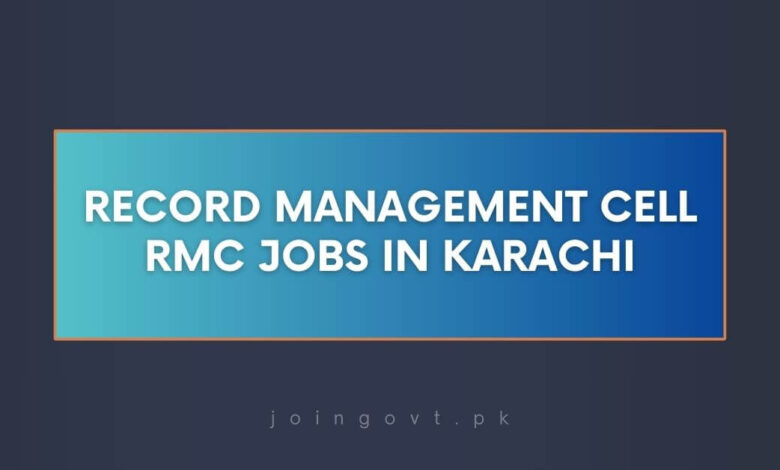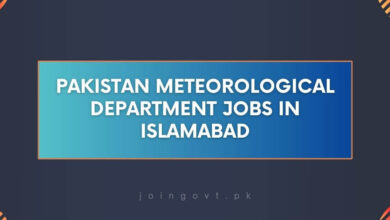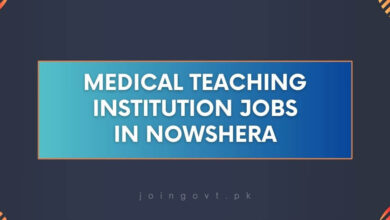Record Management Cell RMC Jobs in Karachi – Apply Now

The Sindh Board of Revenue’s Record Management Cell (RMC) is in search of qualified candidates for a variety of positions. Applicants may submit their applications for the most recent government management positions with the Board of Revenue by the deadline specified in the newspaper advertisement. Read the complete online advertisement to learn how to apply for the most recent Board of Revenue job openings. The salary ranges begin at PKR 250,000.
Details About Record Management Cell RMC Jobs in Karachi:
| Industry | Government |
| Hiring Organisation | Sindh Record Management Cell |
| Jobs Location | Karachi, Pakistan |
| Education Requirements | Intermediate | Bachelor | Master | BA | DAE | BS |
| Vacancies | 200+ |
| Newspaper | Express. Jang |
| Address | Revenue House Adjacent Dr. Ziauddin Hospital Clifton Block-6, Karachi, Sindh, Pakistan |
Educational Qualifications:
The specific educational foundation that is mandatory for a given position may differ. Intermediate (FA/FSc) to Master’s (MA/MSc) degrees, or equivalents such as DAE (Diploma in Associate Engineering) and BS (Bachelor of Science), are the minimum requirements.
To obtain comprehensive details regarding the application instructions and specific educational prerequisites, kindly consult the official advertisement that has been published in the Daily Jang ePaper.
Check Also: NAB Jobs in Pakistan 2024 – Apply Online
Benefits of Record Management Cell RMC Jobs in Karachi:
- Career Stability: Record management serves as a critical operational component in businesses spanning diverse sectors. Securing employment opportunities at an RMC thus guarantees a stable professional trajectory.
- Professional Growth: Employment with RMC provides prospects for career progression and development. You may advance to higher-level positions within the organization as you acquire expertise and experience in record management systems and practices.
- Transferable Skills: The acquisition of compliance knowledge, organization, attention to detail, and data management expertise are all acquired through employment in an RMC. These abilities apply to a wide range of industries and positions.
- Efficiency Contribution: The implementation of efficient record management practices streamlines operations by guaranteeing the organization, accessibility, and currency of information. You contribute to the streamlining of processes and enhancement of workflow efficiency as an RMC professional.
- Career Flexibility: The demand for record management skills transcends industries, thereby affording individuals a degree of career flexibility. Your talents are applicable in numerous sectors, including healthcare, finance, government, and education.
- Intellectual Challenge: The task of records management entails the resolution of intricate issues in data organization, compliance, and the retrieval of information. Intellectual challenges are present at RMCs, which maintain the work environment intriguing and engaging.
- Personal Reward: Ensuring the efficient operation of an organization via proficient record administration can contribute to job satisfaction. Acknowledging the contribution of one’s work towards order maintenance and conformance engenders a sense of job satisfaction.
- Continuous Learning: The evolution of record management technologies and practices necessitates ongoing education. Employment in an RMC facilitates the maintenance of knowledge regarding the most recent developments, tools, and regulations within the discipline, thereby encouraging ongoing education and career growth.
- Team Collaboration: RMC positions frequently necessitate collaboration with coworkers from various departments to guarantee the accurate maintenance and accessibility of records. This environment promotes the development of relationship-building and collaboration abilities.
- Risk Mitigation and Regulatory Compliance: Efficient record management is an indispensable component in ensuring compliance. By upholding compliance standards and maintaining accurate records, you make a valuable contribution to the overarching risk management strategy of the organization.
- Job Security: Record management professionals in organizations that rely on it to maintain operations and adhere to regulations benefit from job security and long-term career opportunities.
- Possibilities for Specialization: Opportunities for specialization exist within the field of record management in domains including information governance, electronic records management, document control, and archives management. Devoting oneself to a specific niche can augment one’s expertise and market appeal.
Available Positions:
- Coordinator
- Binder
- Record Superintendent
- IT Assistant
- Computer Operator
- Project Coordinator
- Scanning Technician Operator
- Archive Assistant
- Data Assistant
- Data Entry Operator
Frequently Asked Questions:
-
What do you mean by records management?
Records management is a managerial discipline that oversees the creation, receipt, maintenance, use, and disposal of records effectively and methodically. Its responsibilities include capturing and preserving evidence and information about business activities.
-
What are the five stages of record management?
The life cycle of a record comprises five fundamental phases: inception, upkeep and utilization, ultimate disposal, storage, and protection.
-
What are the five functions of records management?
Classification or categorization of record groups is utilized by records managers to methodically organize records that are produced and supported by an organization. Classifications of this kind facilitate operations such as record creation, organization, storage, retrieval, movement, and elimination.




